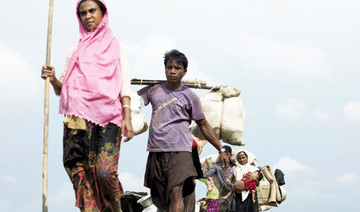PHOENIX: Vice President Kamala Harris on Friday will make her first visit to the US-Mexico border since becoming the Democratic presidential nominee to confront head-on one of her biggest vulnerabilities ahead of the November election.
She is scheduled to appear in Douglas, Arizona, as former President Donald Trump and his fellow Republicans pound Harris relentlessly over the Biden administration’s record on migration and fault the vice president for spending little time visiting the border during her time in the White House.
Immigration and border security are top issues in Arizona, the only battleground state that borders Mexico and one that contended with a record influx of asylum seekers last year. Trump has an edge with voters on migration, and Harris has gone on offense to improve her standing on the issue and defuse a key line of political attack for Trump.
In nearly every campaign speech she gives, Harris recounts how a sweeping bipartisan package aiming to overhaul the federal immigration system collapsed in Congress earlier this year after Trump urged top Republicans to oppose it.
“The American people deserve a president who cares more about border security than playing political games,” Harris plans to say, according to an excerpt of her remarks previewed by her campaign.
After the immigration legislation stalled, the Biden administration announced rules that bar migrants from being granted asylum when US officials deem that the southern border is overwhelmed. Since then, arrests for illegal border crossings have fallen.
Harris will also use her trip to remind voters about her work as attorney general of California in confronting crime along the border. During an August rally in Glendale, outside Phoenix, she talked about helping to prosecute drug- and people-smuggling gangs that operated transnationally and at the border.
“I prosecuted them in case after case, and I won,” Harris said then.
Florida Democratic Rep. Maxwell Frost, at 27 the youngest member of Congress and a leading advocate for Harris with young and Hispanic voters, said that in backing stricter enforcement, Harris is trying to “strike a chord” and “she understands that, right now, there is a crisis at the border. It’s a humanitarian crisis.”
“That’s why she’s pushing for more resources at the border so that we have an orderly process, which is really important,” Frost said. “But, the thing is, that’s where Donald Trump stops, is just at enforcement.”
The vice president’s trip to Douglas thrusts the issue of immigration into the brightest spotlight yet less than six weeks before Election Day.
Trump didn’t wait for her to arrive there before pushing back.
On Thursday, he delivered a lengthy diatribe from New York, declaring that “anything she says tomorrow, you know is a fraud because she was the worst in history at protecting our country. So she’ll try and make herself look a little bit better. But it’s not possible.”
A day earlier, at a rally in North Carolina, Trump told voters that “when Kamala speaks about the border, her credibility is less than zero.”
The Trump campaign has also countered with its own TV ads deriding the vice president as a failed “border czar.”
“Under Harris, over 10 million illegally here,” said one spot. However, estimates on how many people have entered the country illegally since the start of the Biden administration in 2021 vary widely.
Harris also never held the position of border czar. Instead, her assignment was to tackle the “root causes” of migration from three Central American nations — El Salvador, Guatemala and Honduras — that were responsible for a significant share of border crossers.
The vice president took a long-term approach to an immediate problem, helping persuade multinational corporations and Latin American businesses to invest in the region. That, she argued, would create jobs and give locals more reasons to stay home rather than take the arduous trek north.
Still, Trump has continued to decry an “invasion” of border crossers.
Polls show that most American trust him to handle immigration more than they do Harris.
Douglas, where Harris will appear, is an overwhelmingly Democratic border town in GOP-dominated Cochise County, where the Republicans on the board of supervisors are facing criminal charges for refusing to certify the 2022 election results. Trump was in the area last month, using a remote stretch of border wall and a pile of steel beams to draw a contrast between himself and Harris on border security.
The town of 16,000 people has strong ties to its much larger neighbor, Agua Prieta, Mexico, and a busy port of entry that’s slated for a long-sought upgrade. Many locals are as concerned with making legal border crossings more efficient as they are with combatting illegal ones.
Harris heads to the US-Mexico border to face down criticism of her record
https://arab.news/rjexw
Harris heads to the US-Mexico border to face down criticism of her record

- Ahead of Harris’ visit, Trump predicted that the vice president would try to make her record look better but he said “it’s not possible”




























